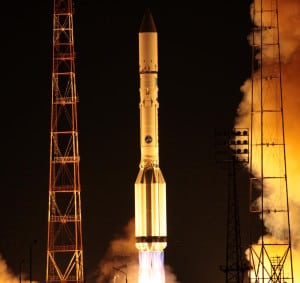Express AM6 Launch Revives RSCC’s Constellation Renewal Efforts
[Via Satellite 10-22-2014] On Oct. 21 a Proton rocket carried the Russian Satellite Communications Company (RSCC) Express AM6 satellite into orbit. The government launch marks the second consecutive successful Proton mission since its May failure, and gives a fresh restart to RSCC’s fleet renewal plan.
Originally RSCC intended to conduct five launches this year, with a final sixth launch in 2015. But Proton’s launch failure earlier this year put a freeze on launches for roughly four months and claimed RSCC’s Express AM4R — a replacement satellite for Express AM4 that never reached its proper orbit. The most recent launch is RSCC’s first successfully orbited satellite since the Express AT1 and AT2 Proton dual launch in March. Now that Proton launches have resumed, RSCC is eager to maintain a healthy cadence.
“Another two spacecraft — Express AM7 and AM8 — are expected to be launched in the first quarter of the next year,” said Yuri Prokhorov, general director of RSCC.
Russia’s ISS-Reshetnev built the Express AM6 satellite on the heavy-class Express-2000 platform in partnership with MacDonald Dettwiler and Associates (MDA) and the Russian Radio Research and Development Institute. The 3,358 kg satellite provides 12.1 Kilowatts of payload power and is the second ISS Reshetnev has built on the Express 2000 bus, the first being RSCC’s Express AM5 that launched at the end of 2013.
The Express AM6 satellite is also ISS-Reshetnev’s first to use an improved xenon pressure tank. The satellite is using electric propulsion to reach its orbital slot at 53 degrees East. Following the launch, ISS Reshetnev confirmed mechanical systems are operating normally and that the satellite had turned to face the sun. Arrival in Geostationary Earth Orbit (GEO) is expected during the first quarter of 2015, following in-orbit testing.
“It would not be much of an exaggeration to say that the launch of the Express AM6 is the most anticipated event of the year in the satellite industry,” said Prokhorov.
Since April, RSCC’s Express AM5, which also used electric propulsion for orbit raising, has been servicing Siberia and the Far East as part of Russia’s Federal Target Program. RSCC’s newest satellite will bolster and expand coverage across European Russia, the Urals and Western Siberia as well as the Middle East, Europe and Africa. Express AM6 used the reduced size of its propulsion system to pack in 72 transponders operating in C, Ku, Ka and L band, along with 11 antennas. The satellite has more than 2,700 MHz in combined capacity.
According to RSCC, the Federal Target Program “Development of TV and Radio Broadcasting in the Russian Federation for 2009-2015” guided the satellite’s design. The company will use the satellite for digital television, telephony, video-conferencing and other applications.
RSCC is keen to use the Express AM6 and future satellites for to enter new markets. At SATELLITE 2014, Andrey Kirillovich, director of integration services and projects at RSCC highlighted the maritime VSAT market as an area of increasing activity. In particular, he mentioned more vessels trafficking the Northern Sea route from Asia to Europe. Additionally, while Russia remains the company’s primary market, RSCC is looking to expand in Sub-Saharan Africa, Southeast Asia and Latin America, he said.
Going forward, RSCC has three more satellite launches planned. The Express AM7 will focus primarily on Africa, Europe, Eastern Russia and India, while Express AM8 will bring increased coverage over Africa, Europe and Latin America. The last currently planned satellite, Express AMU1/Eutelsat 36C will bring in Ku- and Ka-band coverage to the European part of Russia and up Eutelsat’s coverage in sub-Saharan Africa. All three are currently planned to launch aboard Proton rockets.
